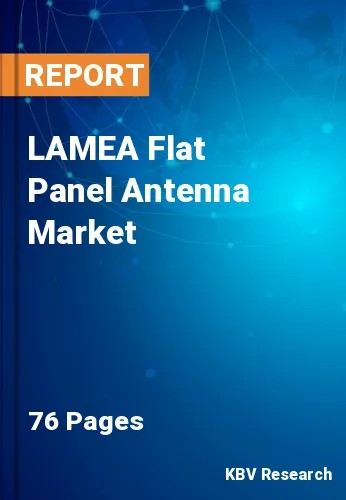The Latin America, Middle East and Africa Flat Panel Antenna Market would witness Market growth of 32.3% CAGR during the forecast period (2022-2028).
Increasing investments in space travel and satellite launches, growing adoption for electronically navigated antennas globally, rising demand for compact and innovative antenna systems, as well as growing adoption of low-cost, low-profile antennas in a variety of commercial as well as military applications will all drive demand in the near future. The deployment of low-earth-orbit constellations and satellites for communication purposes has raised their demand all over the world. Other factors driving Market growth include surging demand for Ku- and Ka-band satellites, along with a growing fleet of autonomous as well as connected cars leveraged for a variety of commercial and military applications that require customized flat panel antennas.
The increasing number of marine activities is majorly responsible for the increasing employment of flat panel antennas into marine transport. Another sector that benefits from low-cost flat-panel antennas is land mobility. Flat panel antennas are broadly being installed into numerous military vehicles in order to provide connectivity in areas with no network coverage. In the coming years, this widespread use of new technologies in the flat antenna Market is expected to rise exponentially.
Flat Panel Satellite Antennas are one of the most highly awaited technical developments in the satellite regional business owing to their potential to deliver connectivity in mobility solutions for terrestrial, aeronautical, and maritime applications. The defense sector of the countries across this region has consistently invested in the development of the initial models. With the new wave of High Bandwidth Satellites and new satellite constellations focusing on mobility and low-cost residential solutions, the effort to build smaller and more affordably priced FPSAs has been the major goal of various regional organizations and Market players. Moreover, flat panels antennas comprise a smaller depth, making them easier to put into airborne or portable applications. To achieve reduced size, each Semiconductor must have enough integration to fit on the rear side of the antenna.
The Brazil Market dominated the LAMEA Flat Panel Antenna Market by Country in 2021, and would continue to be a dominant Market till 2028; thereby, achieving a Market value of $31.5 Million by 2028. The Argentina Market is poised to grow at a CAGR of 33% during (2022 - 2028). Additionally, The UAE Market would exhibit a CAGR of 32% during (2022 - 2028).
Based on Type, the Market is segmented into Electronically steered and Mechanically steered. Based on Frequency, the Market is segmented into Ku, K & Ka band and C & X band. Based on Application, the Market is segmented into Military, Aviation, Commercial, Telecommunications, and Others. The report also covers geographical segmentation of Flat Panel Antenna Market . Based on countries, the Market is segmented into Brazil, Argentina, UAE, Saudi Arabia, South Africa, Nigeria, and Rest of LAMEA.
Free Valuable Insights: The Global Flat Panel Antenna Market is Predict to reach $1.8 Billion by 2028, at a CAGR of 26.9%
The Market research report covers the analysis of key stake holders of the Market . Key companies profiled in the report include Kymeta Corporation, Hanwha Phasor Ltd., TTI Norte S.L., ThinKom Solutions, Inc., Isotropic Systems Ltd., L-com Global Connectivity, OneWeb, ST Engineering iDirect, Inc., China Starwin Science & Technology Co., Ltd., and L3Harris Technologies, Inc.By Type
By Frequency
By Application
By Country
Our team of dedicated experts can provide you with attractive expansion opportunities for your business.

